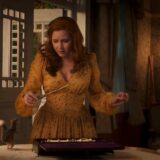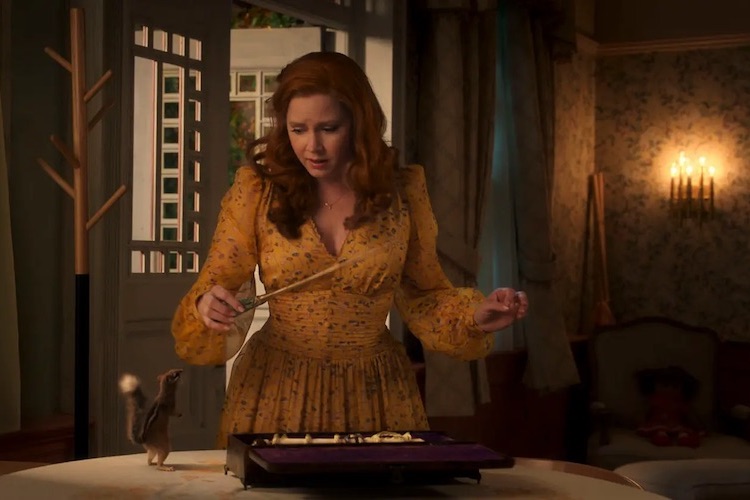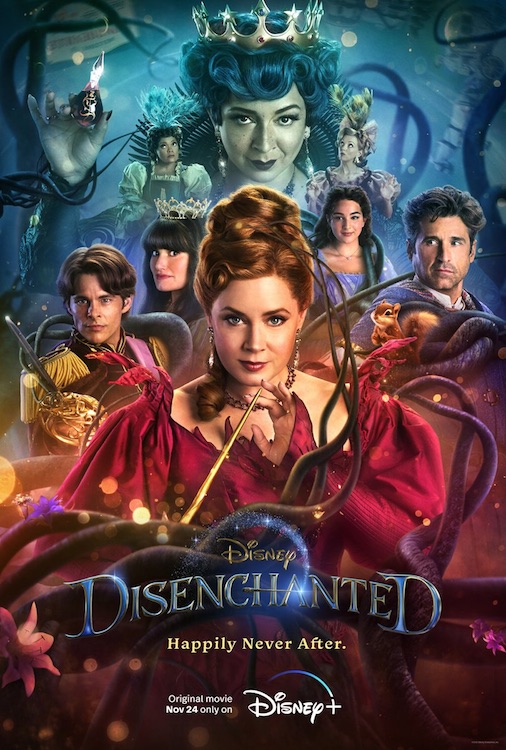
Movie Review: Disenchanted
What We Liked
What We Didn't Like
Disney’s Enchanted (2007) was a funny and subversive tweak of the studio’s fantasy image, fueled by a star-making performance from Amy Adams and a tone that married a love of fairy tale conventions with a self-aware sense of humor. Fifteen years later, Disenchanted can’t quite recapture that magic.
In the years since Princess Giselle (Adams) came from her blissful cartoon kingdom of Andalasia to New York and married lawyer Robert (Patrick Dempsey), she’s found that it’s hard to keep the fairy tale going once you’ve settled down. Robert’s teenage daughter, Morgan (Gabriella Baldacchino) has developed a sarcastic streak and the couple’s new baby keeps them up all hours. Thinking that life in the big city may be the cause of their problems, Giselle and Patrick move to the suburbs of Monroeville.
But their problems only intensify in suburbia. Morgan misses her friends, and their large, castle-like home is falling apart. Giselle instantly gets on the wrong side of the town’s most powerful woman (Maya Rudolph). When Andalasian friends Edward (James Marsden) and Nancy (Idina Menzel) gift Giselle with a magic wishing wand, the princess transforms the bland suburbs into a fairy-tale kingdom, but quickly learns that magic comes with its own pitfalls.
Enchanted worked so well because, in addition to Adams’ effervescent performance, it derived a great deal of humor from the way it let fantasy earnestness clash with real-world disillusionment. It worked from a focused script that acknowledged both the corniness and appeal of fairy-tale conventions and argued that a little bit of doe-eyed winsomeness could make a cynical world a better place.
Disenchanted is hobbled from the start by a script unsure of what story it wants to tell. The idea of a fairy-tale princess realizing that happily ever after isn’t all it’s cracked up to be, could be fun and subversive, and that seems to be the direction Disenchanted is heading throughout its first act. Giselle tries to keep her unflagging optimism even as romance gives way to nights with a sleepless baby, her dream castle crumbles around her, and her old friends remind her of the magic of her old life. Her husband, who used to be energized by his job, must take a soul-killing train ride into the city each day. There’s material for a funny story about marital doldrums and suburban ennui, with a magical twist.
But once Giselle turns Monroeville into a fantasy kingdom, the theme instead focuses on her developing a vain streak and fighting her impulses to turn into a wicked stepmother. Again, there’s potent material for a story about someone from a fantasy world — in which stepmothers are traditionally villains — struggling with taking on the role herself. But the turn comes out of nowhere and abandons the thematic threads the story had been setting up; and by making Giselle’s wicked side a completely different entity that she has no control over, it robs the character of any internal tension and turns her into a comedic prop.
In the decade and a half since Enchanted, Adams has been nominated five times for an Academy Award (she had been previously nominated for Junebug), and it’s generally accepted that she’s incapable of giving a bad performance. She’s reliably the standout here, even if after a decade in the real world, Giselle’s naivety and sunniness seem less endearing and suggest that living with her is like being trapped in eternity with a Disney Adult. While the “wicked Giselle” plot largely falls flat, Adams has a great deal of fun and the movie’s few genuinely funny moments come from the glee with which she rips into every vain bon mot.

Amy Adams in “Disenchanted.” Photo Courtesy of Disney Enterprises, Inc. – © 2022 Disney Enterprises, Inc. All Rights Reserved.
The rest of the cast is a mixed bag. Marsden, the first film’s comedic standout, still gets laughs with his over-exuberant performance, but the actor’s limited to only a few brief appearances. Dempsey attempts to step into the dashing-but-dumb hero role as Robert engages in a heroic subplot, but he quickly reveals why he is largely relegated to being the straight man instead of headlining comedies (and the one song he participates in suggests that maybe he shouldn’t aim for the Great White Way anytime soon). Menzel turned into a superstar with Frozen shortly after Enchanted’s release, and the film wisely lets her belt out a few musical numbers this time; the songs aren’t great, but Menzel can still hit the big notes like few others. Rudolph is largely wasted aside from a few funny raises of her eyebrow and a standout song late in the film, and Baldacchino is fine as the young heroine, but her role as written is strictly traditional Disney teen blandness. Griffin Newman, most well-known as the co-host of the podcast “Blank Check,” voices Giselle’s chipmunk buddy Pip; he’s grating as the goodhearted sidekick, but earns a few laughs when Pip discovers his own joy of the dark side.
Director Adam Shankman struggles to keep the film moving, but his go-to moves are shrill slapstick comedy and reheated sequences from the first film. Shankman was the director of Hairspray, and there are a few musical sequences with fun visual flourishes, but the songs are also hit-and-miss — and those misses feel a little bit more disappointing when you realize Disney legends Alan Menken and Stephen Schwartz wrote them. At two hours, the film feels both overstuffed and undercooked, a jumble of plot convolutions that never find thematic focus, and the film lacks its predecessor’s wit, embracing too much of the fairy tale without finding a clever way to undercut it all.
Coming just a few weeks after Pinocchio and Hocus Pocus 2, Disenchanted is more proof that Disney isn’t too concerned about quality when it comes to its original streaming films. They just need something to keep subscribers clicking. These movies don’t have to be good; they just have to exist. And the “just good enough” ethic the Mouse house seems to be taking toward these straight-to-streaming prequels is quickly tarnishing the studio’s legacy, leaving fans a bit disenchanted themselves.



